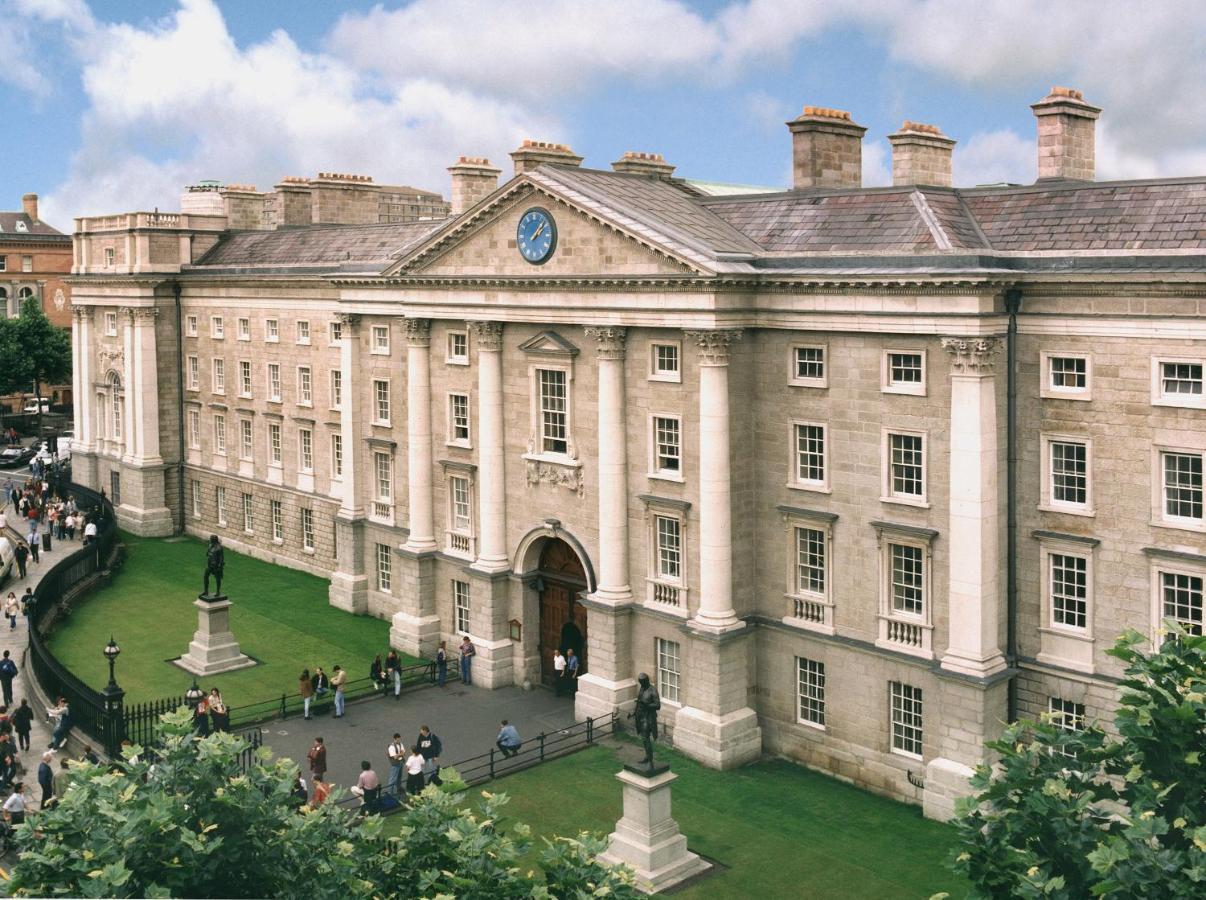Get Admitted to your Dream University – Trinity College Dublin

Trinity College, officially known as The College of the Holy and Undivided Trinity of Queen Elizabeth near Dublin, is the single constituent college of the University of Dublin. The college was established in 1592 by Queen Elizabeth I as “the mother of a university” that was based on the collegiate colleges of Oxford and Cambridge. According to the founding charter, “the Provost, Fellows, Foundation Scholars and other members of the Board” are responsible for the university’s formal incorporation. It is the oldest surviving university in Ireland and one of the seven historic colleges of Britain and Ireland.
Numerous books, movies, and television shows have been based on the college’s main campus and urban legends. Trinity College offers degree and diploma programmes at the undergraduate and graduate levels through three colleges that collectively house 23 schools. The Book of Kells, which arrived at the college in 1661 for preservation following the Cromwellian raids on religious institutions, is one of the significant quantities of manuscripts in the Library of Trinity College, which serves as a legal deposit library for Ireland and Great Britain. It has approximately 7 million printed books.
Many of Ireland’s most popular poets, playwrights, and authors, including Oscar Wilde, Jonathan Swift, Bram Stoker, Oliver Goldsmith, Thomas Moore, and many others, received their education at the university. The most famous Nobel Laureates include Samuel Beckett, Ernest Walton, Mairead Maguire, and more.
Trinity College has three Faculties –
ADMISSION & REQUIREMENTS
Entry into undergraduate courses is majorly done through the Central Applications Office (CAO). Since CAO allows application to only a maximum of five colleges/courses, some students choose to apply to Trinity College directly. It is one of the few colleges in Ireland that has a direct application process available. There is fierce competition for the popular programmes, and entry requirements for courses may change from year to year depending on the number of openings and the number of applicants.
All applications are assessed individually and the submitted scores and other prerequisites do not guarantee admission. Entry to undergraduate programmes at Trinity is competitive and based on academic merit. The standard matriculation requirements are passing grades in English, Mathematics, a language other than English, and a full set of valid subjects for your examination system.
GCE ‘A Levels’
To be considered for admission to the University you must:
-
Present six subjects at grade C or above on GCSE or Advanced Subsidiary GCE (AS) papers. Two of these subjects must be at grade C or above on Advanced GCE (A-Level) papers.
-
The six subjects above must include:
A pass in English AND a pass in mathematics and a pass in a language other than English
OR
a pass in Latin and a pass in a subject other than a language
International Baccalaureate (IB)
3 subjects at grade 5 at Higher Level and 3 subjects at grade 4 at Standard Level, to include English, mathematics and another language. Mathematics: Analysis and Approaches and Mathematics: Applications and Interpretation are both acceptable. However, for courses with a Higher Level Mathematics requirement it is strongly recommended to take Mathematics: Analysis and Approaches at HL as this is likely to be a mandatory requirement for those courses.
Recognised School Leaving Qualifications (Indian)
-
Higher Secondary Examination (HSC)
-
Central Board of Secondary Education (CBSE) – All India Senior School Certificate Examination (AISSCE)
-
Council for the Indian School Certificate Examinations (CISCE) – Indian School Certificate Examination (ISC) Requirements
Minimum Matriculation:
-
Overall average of 80% – 85% in six subjects in Grade XII or if a student did not take 6 subjects in Grade XII, in five subjects in Grade XII and one (different) subject in Grade X.
-
A language other than English, and Mathematics must be taken as a subject up to Grade X.
Subject requirements:
Where there is a specific subject requirement for a specific programme, a minimum grade of 75% in that subject at Grade XII is required.
English Proficiency Tests
All applicants must present an English language qualification. Accepted/Permitted English language qualifications are:
|
TEST |
SCORE REQUIRED |
|
GCSE |
a grade C or grade 5 or better in English Language. |
|
IB |
English A1, A2 or B: 5 at Higher Level (4 at Standard Level if presenting IB through English) |
|
TOEFL |
Paper based 570 (with a TWE score of 4.5) / Computer based 233 (with a score of 4.5 in essay) / Internet based 90 (with a written score of 21) |
|
IELTS |
Total of 6.5 (no individual band below 6). For Dental courses: IELTS (academic version) 7 (no individual band below 7) For Clinical speech and language studies: IELTS (academic version) 7 (no individual band below 7) |
|
Pearson Test of English (PTE) |
PTE Academic: a minimum score of 63 (with no section score below 59). |
|
Duolingo English Test |
Minimum overall score of 120/160 with no section below 105 |
In addition, to qualify for admission to a degree course at the University you must meet the minimum matriculation requirements (pass grades in English, Mathematics, a language other than English, and a full set of valid subjects for your examination system). Trinity College has two intakes annually –
|
INTAKE |
WHEN TO APPLY |
|
Autumn Intake (September) |
October (previous year) to March |
|
Spring Intake (January/February) |
September/October the previous year |
Other Requirements
-
Academic Transcripts – marksheets from grade IX to XI are required, along with predicted score & first term marks of grade XII are also needed to submit your application.
-
Letter(s) of Recommendation (LOR) – Trinity College requires two LOR, and students can submit one professional LOR also if they have work experience.
-
Statement of Purpose (SOP) – It is a crucial part of the application in which students describe their interest in the chosen field of study, their activities and their future plans, especially in competitive courses where the SOP provides valuable insights into the students’ thought process and motivations. Trinity College requires its applicants to submit one SOP describing the activities they have participated in, interest in the subject, extraordinary achievements, etc.
-
Academic Resume – It is another requirement as part of the application process. This resume is a summary of your academic and professional qualifications, achievements, contributions, extracurricular activities, projects, and skills that you have acquired during your high school years.
-
Portfolios & Entrance Tests – If a student is applying to a design program or architecture course, they need to submit a portfolio as guided by the university. If a student is applying for medical studies, they need to appear for the Health Professions Admission Test (HPAT). Students will be eligible to compete for undergraduate medicine places provided they achieve at least 220 (subject to change each year) out of 300 in the test and meet the matriculation requirements of the Medical School. HPAT is conducted each year in the month of February. The test score is valid for only one year – students appear for it in the year of their high school (class XII) graduation. It is an aptitude test assessing similar qualities to the UKCAT (UK Clinical Aptitude Test). The HPAT-Ireland test is a 2½ hour multiple choice paper-based test, consisting of three modules:
a) Logical Reasoning and Problem Solving )
b) Interpersonal Understanding (much like the situational judgment test, this assesses your responses to several scenarios)
c) Non-Verbal Reasoning (alike to abstract reasoning of the UKCAT, you will have to find patterns in shapes
Other than studying Medicine, there are no other entrance exams at an undergraduate level. Students willing to submit ACT or SAT scores can do so, but it is not a mandatory requirement by the university.
EXPENSES AND SCHOLARSHIPS
The average tuition fee for studying at Trinity College, Dublin is €18,860 per annum, and it can go as high as €55,000 per annum for courses like medicine. The cost of living for international students can vary between €7,000 – €12,000 per annum. All international students (both EU/EEA and non-EU/EEA citizens) must pay a student contribution fee of maximum €3,000 per year for student services, like examination entries and support for clubs and societies.
The Irish government and some universities provide financial assistance and scholarships to international students on the basis of merit, need, student or course-specific grants, etc. The most popular scholarship is the Government of Ireland International Education Scholarship. It offers 60 types of scholarships to international students pursuing bachelor’s, master’s, and doctoral programs. The scholarship amount includes a €10,000 stipend and covers the tuition and registration fees. University specific scholarships can be verified at their respective websites for detailed information.
Trinity College, Dublin offers international students with quality education, expert faculty, and a wide array of courses to huge research and career opportunities. Whether you want to study humanities or engineering, that’s an Irish institution that can match your curriculum to perfection. And by following the above-mentioned steps you can get admitted to your dream college, Trinity College (Dublin, Ireland).
About the Author:

Ankita is an Admissions Specialist & Editor at Scholarly, and has 4 years of experience in study abroad. She has a Masters degree in English Literature from University of Delhi. Ankita is an ardent reader who enjoys fiction and composes personal poetry. Her interests lie in learning more about the ancient history of the world and how she can pen down the experiences she gains in her life as articles.
Scholarly helps ambitious international students locate the right universities and courses to pursue their education. We provide college credit courses and research papers to students that want to learn more and differentiate themselves. We help students develop and present their best version to their dream university. Our recommendations are based on the student’s field of interest, academic performance, financial resources and career plans. We provide test preparation classes from the best teachers to help improve scores and thus the prospects for admission. We also assist students with their visa and loan applications to reduce the anxiety associated with international education.
For additional questions about international education, choice of majors, university selection or admission strategies please visit the Questions section of our website.

 Previous Post
Previous Post Next Post
Next Post
